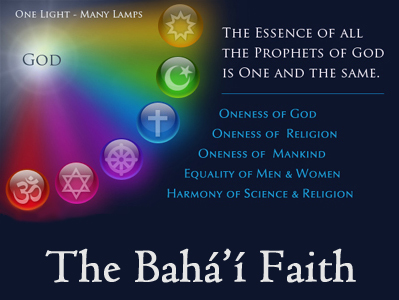

Bahá’u’lláh calls for the elimination of all forms of prejudice, full equality between the sexes, universal education, an auxiliary global language and elimination of extremes of wealth and poverty. The quest for spirituality has remained a constant through time, while the conditions of society are changing. To Bahá’ís religion provides the foundations for individual spiritual development and the progress of society. Both prayer and a moral life are required in the “Bahá’í life.” The quest for spirituality requires of the individual the suppression of the “lower self” (selfish yearnings provoked by ego and desire) and the cultivation of the “higher self” (the capacity to express spiritual and altruistic capacities latent in every person). The participation of the individual in the affairs of this world constitutes preparation for the existence of the soul in subsequent “worlds of God” beyond this physical earth. This view of religious history as “progressive revelation” acknowledges the role of each of the revealed religions in the development of civilization, upholds the Divine station of the Prophets and attributes to human error and folly the divisions and conflicts that have emerged in their names.
BAHI FAITH SERIES
What knowledge we do possess of the Divine has been “dispensed” from that ultimate source by a series of prophetic figures, including the few known to history: ADAM, Krishna, BUDDHA, Zoroaster, Abraham, Moses, CHRIST, Muhammed and, most recently the Báb and Bahá’u’llah. Bahá’ís acknowledge a Divine purpose to creation and the existence of a creator who remains infinitely beyond the comprehension of man and thus essentially unknowable.

The purpose of his Revelation, he stated repeatedly, was to provide the divine guidance required for humanity’s spiritual and social well-being as it comes of age as a global society.īahá’í Beliefs. The premise underlying all facets of the Bahá’í Faith is the path towards unity.

In the years until his passing in Akka, Palestine (modern-day Israel) in 1892, Bahá’u’lláh revealed a great number of treatises on mystical, spiritual, social and ethical subjects. In divine response to the seeds of expectation that had matured through the Revelation of the Báb, Bahá’u’lláh, who had been among the Báb’s ardent admirers, received an intimation of his divine mission in 1852, confided it to his followers in 1853 (near the beginning of his exile) and proclaimed it publicly in 1863. Consequently the Báb and thousands of his followers were martyred at the urging of militant religious foes. The central figure of the Bahá’í Revelation was Mirza Husayn Ali, a member of the Persian nobility, born in Tehran in 1817 who was known as Bahá’u’llah, a title which means “The Glory of God.” The term “Bahá’í” means “follower of the Glory” or “follower of the light.” Bahá’ulláh’s mission was heralded by Siyyid’Alf Muhammad (The Báb) who began teaching in Shiraz in 1844 his own Divine mission, which was to announce the imminent emergence of the Divine Revelator promised in the scriptures of all the Holy books. (Bahá’í Faith) The Bahá’í Faith originated in Persia (modern day Iran) in the nineteenth Century.


 0 kommentar(er)
0 kommentar(er)
